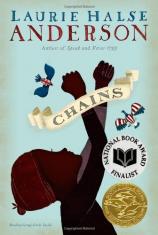Chains
Review
Chains
When I first read the synopsis of Laurie Halse Anderson's new novel, I was initially put off. After all, this book --- which focuses on the treatment of slaves by Patriots and Loyalists during the American Revolution --- seemed to cover much of the same historical and thematic ground as a series near to my heart: M. T. Anderson's brilliant Octavian Nothing, the second part of which was published earlier this fall. How dare another book try to address those same issues! I thought to myself in disbelief.
But I was determined to give CHAINS a chance. For one thing, it's written by one of my favorite young adult authors. Plus, it was nominated for a National Book Award about an hour before I started reading it. In the face of this evidence, it was hard to maintain my skepticism. So I overcame my doubts and sat down to read --- and am I ever glad I did.
CHAINS is set in 1776 and centers on Isabel, a slave girl. At the novel's opening, Isabel is torn between mourning the death of her mistress and quietly celebrating her freedom; according to her mistress's will, Isabel and her younger sister Ruth are to be freed upon the mistress’s passing. No one seemed to tell that to the mistress's relatives, however, who are determined to sell Isabel and Ruth to the highest bidder as soon as possible.
The highest bidders turn out to be the Locktons, a couple heading back to their home in New York City after fleeing Boston, which has been effectively seized by the Patriots during the early battles of the Revolutionary War. Mr. Lockton and his wife are Loyalists, convinced that if these few pesky revolutionaries can just be controlled, the king's reign will be established once again and the proper order of things will be restored. Mr. Lockton is not taking any chances, though --- he and his Tory friends are busy planning secretive action against General Washington and his troops.
Convinced by a slave named Curzon --- whose master is among the Patriots --- to spy on the Locktons' activities, Isabel does so at great peril to herself because she's convinced that she'll win her freedom as a result. Much to Isabel's anger and disillusionment, however, her espionage only leads to a painful and humiliating branding as well as a separation from her beloved sister. It's no wonder, then, that Isabel, who hears so much about freedom and loyalty from the growing revolutionary forces in New York City, eventually thinks to herself, Whenever I heard the words “liberty” or “freedom,” I wanted to spit in the dust. As Isabel works out where (if anywhere) her own loyalties should lie, she is forced to develop unlikely allies and use her own talents for memory, creativity and perseverance to help her spirit survive.
Like Anderson's earlier historical novels, CHAINS is meticulously researched and seemingly authentic, right down to the old-fashioned typeface and historical quotes that open each chapter. Anderson also includes a very useful question-and-answer section at the back of the book that helps clear up historical misunderstandings and explain this often-overlooked aspect of our country's early history.
Far more than dry history, CHAINS is also a portrait of a single young woman struggling to make her way through a social structure that practically guarantees her failure. Isabel's body may be captive, but her spirit and imagination can never be truly enslaved. On the surface of things, this novel and the Octavian Nothing books might appear to be telling the same story. The beauty and brilliance of literature, however, is that good authors' perspectives and visions are startlingly unique. And so it is here, as both Laurie Halse Anderson and M. T. Anderson have brought a particular chapter of American history to life through their fiction.
Reviewed by Norah Piehl on January 5, 2010
Chains
- Publication Date: January 5, 2010
- Genres: Historical Fiction, Young Adult 12+
- Paperback: 336 pages
- Publisher: Atheneum
- ISBN-10: 1416905863
- ISBN-13: 9781416905868




